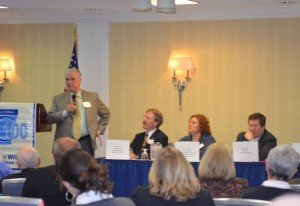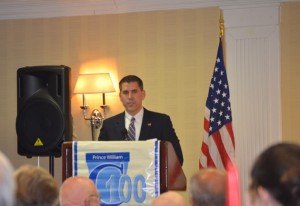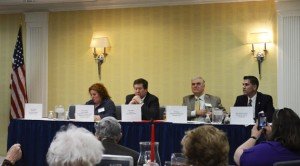
The Prince William Committee of 100 assembled a panel of community leaders to comment on whether or not the Board of County Supervisors should change its revenue sharing agreement (RSA) with the School Board. According to that agreement, the school division currently receives 57.23 percent of county revenues collected from property taxes each year.
The panel consisted of Gainesville District Supervisor and businessman Pete Candland; local nonpartisan political and economic blogger Bill Golden; School Board Chairman and attorney Milt Johns; and educator, columnist and Vice President of the Prince William Education Association (PWEA) Riley O’Casey. David Kinsella, a teacher at Osbourn Park High School and high-school representative with the PWEA, served as moderator.
While panelists presented their views on the revenue sharing agreement, the discussion really focused on whether the RSA best serves the Prince William Schools, which currently have the highest class sizes in the state.
Panelists recognized that regardless of the RSA, a bad economy, quick growth and low proffers all contributed to the problem.
Pete Candland: Distributing Funding is Part of the Job
Supervisor Pete Candland has gone on record saying he is not a fan of the RSA. While he could not convince the rest of his Board to eradicate it last year, he did restructure the equation from 56.5 percent to 57.23 percent, thus providing more needed funding to the school system.
Candland recognized all the other problems inherent in PWC’s system of government, including “rolling out the red carpet for developers” and education proffers that are half of those in neighboring Loudoun County.

However, Candland said the RSA is also a contributing factor to the mess PWC schools now find themselves in, because the RSA does not provide the proper system of “Checks and balances.”
The RSA was suppose to be a “basement” of funds the schools would receive, but instead it has become a “ceiling.” This is wrong, because the school division is hardly given the opportunity to ask for what it really needs.
Candland said the RSA is certainly more comfortable for the elected officials who do not need to battle each other over this tax rate, but ultimately the schools lose out.
Fighting for a percent is a “hassle,” but isn’t fighting for their constituents “part of the job we were elected to perform?” he asked.
Currently, no one is getting his or her hands dirty, because each board can blame the other. The BOCS is not providing enough funding for the schools, but it is not their fault; they simply blame the formula. The School Board is not requesting enough funding, but they too are abiding by the formula.
Candland also points out how the agreement is inflating taxes. Under the current system, should the schools ask for more money, whatever they request needs to be matched on the other side of the equation, the county side. Thereby, taxes go up nearly double to meet actual needs.
Candland said he hates to raise taxes, but would do so to fund the schools if there was no other way, because the county needs to begin to help them climb out of the hole they find themselves in with class sizes.
Bill Golden: the Economy is Getting Worse
Golden perhaps knows more about the economy than most. If he is correct in his predictions, things look bleak for Prince William County.
“We’ve talked about austerity issues in the county, but I’m here to tell you that the more challenging times are ahead of us.”
Most people think we are emerging from a dire recession, but Golden fears there are worse struggles ahead. Golden says, in Prince William, the median income has dropped from $106,000 in 2007 to $97,000 today.
He referred to a George Mason report saying, “The way people earn a living and how much they earn is radically changing,”

Commercial realty is down as well.
He calls for “a fundamental reset” of the way the county operates. One change is to do away with the revenue sharing agreement.
“Damn straight, I would support making the budget a straight deal [if I were a supervisor],” Golden said, because it is so much easier for them.
However, it is not the best system. Golden said the county is going to have to be as lean and transparent as possible.
Milt Johns: It’s a Practical Arrangement
Johns said he could really argue either side of the argument in regards to the RSA, but he ended up being a proponent for the RSA.
RSA may be the best scenario for the School Board, he said. In certain districts, like Virginia Beach, eliminating the RSA meant schools there received less money from their jurisdiction.
Johns does not blame the RSA for not enough school funding. He blames the increase in students due to rapid development.
“When I first came on the board, we had about 63-64,000 students; we’ll have 84,000 in September,” Johns said. “We’re the second largest school system in the Commonwealth of Virginia and 39th in the country.”
Johns said that the RSA keeps the peace between boards, saying that PWC has “two boards that work pretty well together…we don’t have the continuing food fights that we see in neighboring jurisdictions.”
Perhaps the RSA agreement can be adjusted to better fit the needs of the school division, but he said he would not “throw the baby out with the bathwater.”
Riley O’Casey: Our Students Deserve Better
O’Casey defined the RSA using Power Point slides. However, when it comes to whether it is the best arrangement, she left that for the audience to decide.
She thinks there is an advantage that the school division has a pretty good idea of what the schools will be receiving in a given year.
“Me personally, my biggest fear would be, perhaps we would get less funding if we didn’t have the agreement,” she said.
However, she said that the RSA should not inhibit the School Board members from advocating for the students. Just because there is this agreement does not mean they do not have the responsibility to tell the BOCS what the schools really need.
Riley said they should “step out of their comfort zone” and simply say “this is what we need for our students of Prince William County.”
She said the RSA keeps the peace to some degree, but there is still finger pointing going on between the boards. When there is political conflict, whether between Congress and the President or the BOCS and the School Board, she said even her 8th grade students recognize it.
She does not advocate for county politics being more contentious, but she does advocate for students.
“I don’t have a solution,” O’Casey said, but “our students are worth”
Questions and Answers:
After the panelists each spoke, the audience posed questions. Most of these questions were addressed to Supervisor Candland and Chairman Johns.
Johns explained that class sizes reductions were not included in the budget, but were added after discussion with the BOCS. But the supervisors encouraged them to find funding; they did not provide that funding.
When 2/3rds of the superintendent’s plan to fund class size reductions were cut from the budget, in reality, it was never added into the budget. Every year they get more students, but the funding is always very tight, making reductions in class sizes not feasible.
Candland said the BOCS could be more efficient if they stopped calling funds “one time money” and using it on projects, like the burying of the power lines along Route 1, that were outside the normal budget process.
He said that he was able to find an additional $20 million in savings by keeping in agencies accountable to actual spending from previous years.
Johns explained that the School Board members do not have a staff, and receive only part time pay, but they haven’t asked pay increases or additional staff, for that because times are tough. Both the School Board members and supervisors said they rely on citizens to help them decipher and find savings in a budget.Candland said that oversight of the staff is important, but it’s not the job his staff is hired to do.
Kim Simmons suggest that the School Board create some kind of definitive cap on class sizes and then create a plan to achieving those limits.
Support Bristow Beat - Donate Today!